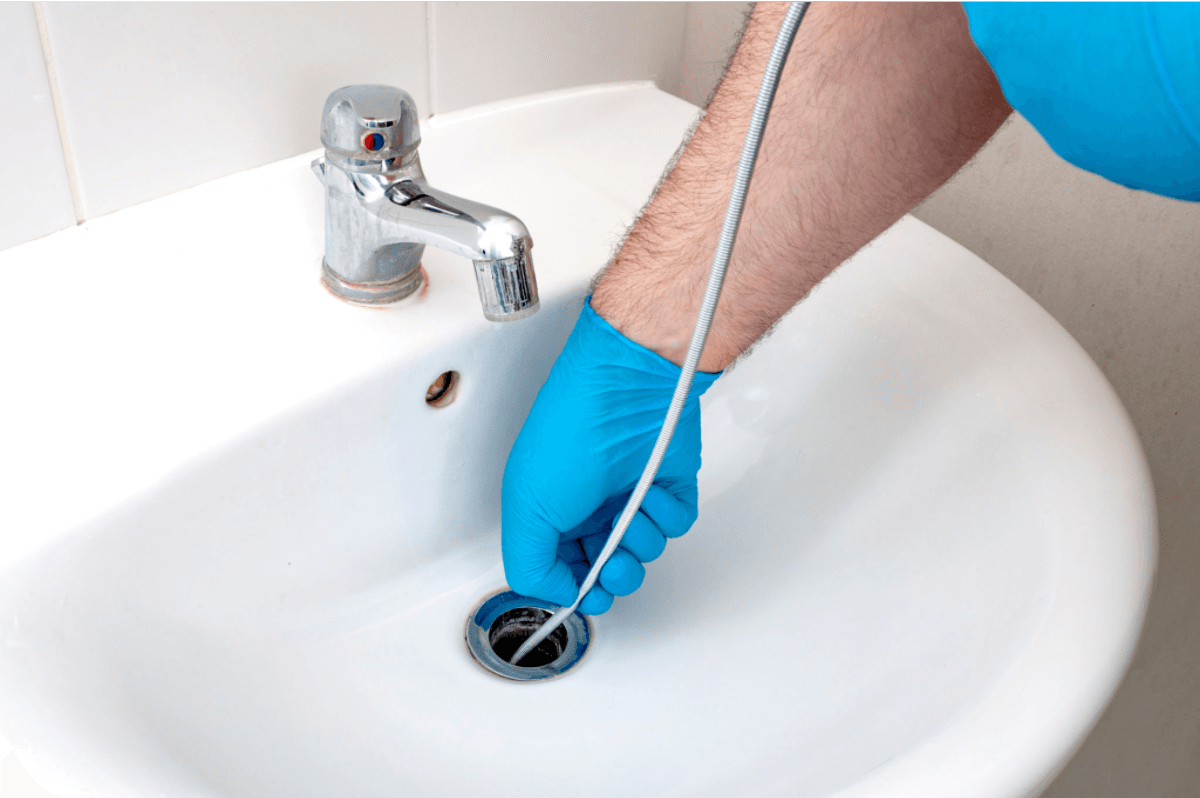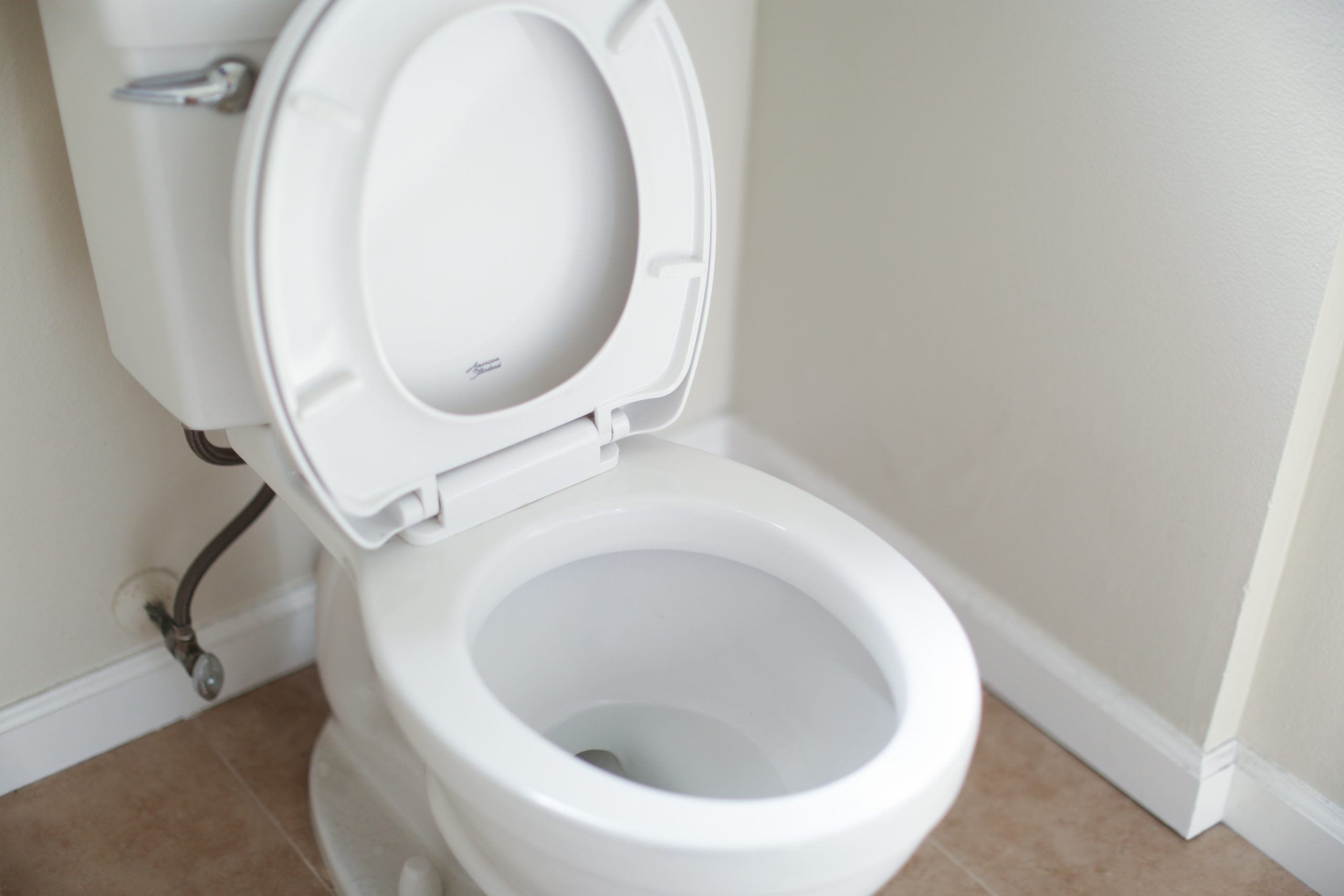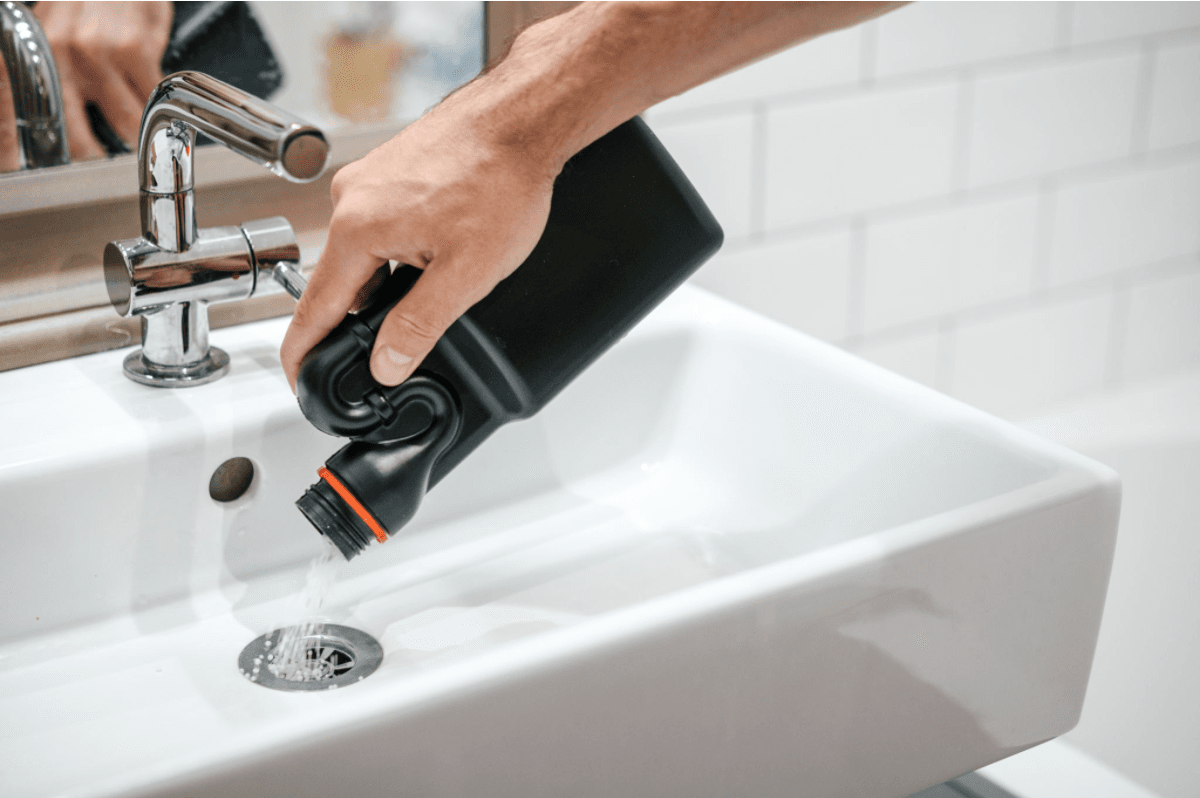Are you tired of dealing with slow-draining sinks and water pooling in your home or business? Don’t worry, you’re not alone in facing these plumbing challenges. Clogged drains can disrupt your daily routine and lead to costly plumbing problems. But fear not, because this comprehensive guide is here to empower you with a range of proactive measures and expert insights, specifically tailored to help you keep your drains clear and your plumbing system in optimal condition.
Each droplet of water that flows down your drains has the potential to contribute to a clog. Whether it’s food particles, soap scum, hair, or other debris, various substances can gradually accumulate in your pipes over time, causing obstructions and hindering water flow. The purpose of this guide isn’t just to deal with clogs after they occur – it’s about preventing them altogether. Whether you’re a homeowner striving to maintain the tranquility of your living space or a business owner focused on the efficient operation of your establishment, the following tips and strategies will empower you to take control of your plumbing fate.
In the ensuing sections, we will delve into a series of practical and actionable tips designed to address the common culprits of clogged drains. From the essential use of drain screens to proper grease disposal, the significance of regular hot water flushing, and even the world of enzyme cleaners, you’ll gain insights that not only prevent clogs but also contribute to the overall longevity of your plumbing system. But that’s not all – we’ll guide you through the often-overlooked aspect of outdoor drain care and highlight the critical importance of professional inspections. Plus, we’re excited to introduce you to Service by Scott, a trusted plumbing partner right here in Tyler County, TX. With their expert services, you’ll have a reliable ally in maintaining your plumbing system’s health. So, let’s dive into this guide and embark on a journey toward clog-free drains and a plumbing system that functions seamlessly. By the end, you’ll have the knowledge and tools to ensure your pipes remain clear and your property remains a haven of comfort and efficiency.

The Common Culprits of Clogged Drains
Understanding the common causes of drain clogs is crucial in your journey to maintaining a smoothly functioning plumbing system. By identifying these culprits, you can take proactive steps to prevent clogs and ensure the uninterrupted flow of water through your pipes.
Hair and Soap Scum Buildup
In the realm of bathroom plumbing, hair, and soap scum are notorious troublemakers. As you shower or wash your hands, strands of hair and soap residue often find their way into your drains. Over time, these seemingly harmless particles accumulate, forming dense clumps that can obstruct water flow. A simple habit of using drain screens in sinks and showers can go a long way in preventing these elements from causing clogs.
Food Residue and Grease
In the kitchen, food residue, grease, and cooking oils are prime contributors to drain clogs. While it may be tempting to rinse leftover food down the sink, it’s essential to remember that many food items can solidify and cling to the interior of your pipes. Grease, in particular, hardens as it cools, creating a sticky buildup that traps other debris passing through. Proper disposal of food waste in the trash and wiping greasy pans before washing them can help keep your kitchen drains flowing freely.
Foreign Objects
Accidentally dropping small objects down the drain is a common occurrence that can lead to major blockages. Items like jewelry, bottle caps, cotton swabs, and children’s toys can find their way into the pipes, creating obstructions that impede water movement. The use of drain screens and being mindful of what goes down the drain are effective ways to prevent such incidents.
Mineral Deposits and Hard Water
In regions with hard water, mineral deposits can accumulate inside pipes, gradually narrowing the passage for water flow. These deposits, primarily consisting of calcium and magnesium, adhere to the pipe walls, reducing the pipe’s diameter over time. This not only restricts water flow but also makes the pipes more susceptible to other debris sticking to the mineral buildup. Installing a water softener can help mitigate the impact of hard water on your plumbing system and reduce the risk of clogs.
Excessive Toilet Paper and Flushable Wipes
While toilet paper is designed to dissolve in water, using excessive amounts or flushing items like flushable wipes can lead to clogs. Unlike toilet paper, many flushable wipes do not disintegrate as easily, and their accumulation can lead to blockages in your sewage system. To prevent this, use toilet paper sparingly and avoid flushing wipes or other non-biodegradable materials down the toilet.
Understanding these common culprits of clogged drains empowers you to take proactive measures to keep your plumbing system free from obstructions. By adopting simple habits and regular maintenance, you can ensure the smooth flow of water throughout your home or business, preventing plumbing headaches down the line. In the following sections, we will discuss tips for preventing clogged drains.
Tip 1: Use Drain Screens
One of the easiest and most effective ways to prevent clogged drains is by using drain screens. These simple yet ingenious devices act as barriers, capturing hair, soap scum, food particles, and other debris before they enter your pipes. Installing drain screens is a breeze – they fit snugly over drain openings in sinks, showers, and bathtubs. They not only prevent clogs but also make cleaning up after daily activities much easier.
By using drain screens, you enjoy several benefits. Firstly, they prevent clogs from forming, reducing the need for expensive plumbing repairs. Secondly, they extend the lifespan of your pipes by minimizing debris that enters the plumbing system. Additionally, drain screens are affordable, widely available, and environmentally friendly, as they reduce the need for harsh chemical drain cleaners. Choose the right type of drain screen based on the area you’re covering – finer mesh for hair and smaller particles in bathrooms, and sturdier screens for kitchens to handle food particles and grease. Incorporate drain screens into your routine, and you’ll be well on your way to maintaining clog-free drains and a smoothly functioning plumbing system.
Tip 2: Dispose of Grease Properly
Preventing clogs and maintaining a healthy plumbing system hinges on the proper disposal of grease. A simple yet impactful action involves avoiding the temptation to pour grease down the drain. Instead, allow the grease to cool, gather it in a suitable container, and then dispose of it in your household trash.
Grease might appear innocuous when it’s hot and flowing, but once it cools down, it undergoes a transformation. It solidifies within your pipes, gradually constricting their diameter and creating a breeding ground for potential clogs. By taking the responsible route of letting grease cool before disposal, you not only thwart clogs but also play a part in preserving the environment. This practice reduces the introduction of harmful substances into wastewater systems and contributes to the seamless operation of your plumbing, ensuring a clog-free home and a happier planet.
Tip 3: Regular Hot Water Flushing
Engaging in regular hot water flushing is a proactive measure that can go a long way in maintaining clear and unobstructed drains. This simple practice involves periodically pouring a kettle of hot water down your drains to help dissolve buildup and prevent potential clogs.
Over time, residue from soap, grease, and other substances can accumulate within your pipes, narrowing the passageway through which water flows. By introducing hot water into the equation, you facilitate the breakdown of these deposits, allowing them to be washed away more effectively. The heat from the water helps to loosen and dislodge the clinging particles, ultimately preventing them from solidifying and obstructing the pipes.
The process of hot water flushing is not only easy to perform but also environmentally friendly. It eliminates the need for harsh chemicals and provides a safe, chemical-free way to maintain your plumbing system’s health. By incorporating this practice into your routine, you can enjoy the benefits of improved water flow, reduced risk of clogs, and a more sustainable approach to drain maintenance.

Tip 4: Be Mindful of What You Flush
Being mindful of what you flush down your drains and toilets is a fundamental aspect of preventing clogs and ensuring the longevity of your plumbing system. It’s essential to remember that not everything is suitable for disposal through these channels, and a little caution can go a long way in maintaining clear and trouble-free pipes.
Flushing items that are not designed to break down easily in water can lead to blockages that are not only inconvenient but also potentially damaging to your plumbing infrastructure. Items like hygiene products, cotton swabs, paper towels, and even some “flushable” wipes may not disintegrate as quickly as toilet paper, leading to accumulation and obstruction within the pipes. In the case of kitchen drains, large food particles, coffee grounds, and cooking grease can also contribute to clogs over time.
To prevent these issues, it’s advisable to limit what you flush down your drains and toilets to waste that can be easily broken down and carried away by water. Educating household members and guests about what is and isn’t flushable can help ensure that your plumbing system remains free from unnecessary blockages. By adopting this simple yet crucial practice, you play a significant role in maintaining the smooth and reliable operation of your drains and toilets.
Tip 5: Regular Plumbing Maintenance
Investing time in regular plumbing maintenance is a proactive strategy that pays off handsomely when it comes to preventing clogs and maintaining a healthy plumbing system. This encompassing approach involves a combination of do-it-yourself practices and professional services, ensuring your plumbing infrastructure remains in optimal condition.
Regular plumbing maintenance is a holistic endeavor that covers various aspects of your plumbing system. From checking for leaks and inspecting water pressure to cleaning out drain screens and traps, these routine tasks collectively contribute to the prevention of clogs and the smooth flow of water. Moreover, it provides an opportunity to catch potential issues in their infancy before they escalate into major plumbing emergencies.
When it comes to professional plumbing services, Service by Scott in Tyler County, TX, stands out as a reliable partner in maintaining your plumbing’s health. Their comprehensive drain cleaning services, coupled with expert inspections, can identify and address hidden issues within your pipes that may lead to clogs. By incorporating Service by Scott’s expertise into your plumbing maintenance routine, you’re taking a proactive step towards a clog-free environment. Remember, regular plumbing maintenance isn’t just a once-in-a-while task – it’s an investment in the longevity and reliability of your plumbing system, ensuring that your drains remain clear and your property remains problem-free.
Tip 6: Install a Water Softener
Installing a water softener is a smart move that not only benefits your plumbing system but also enhances the overall quality of water in your home. Hard water, characterized by high mineral content, can lead to mineral deposits within your pipes, gradually causing narrowing and potential clogs. A water softener addresses this issue by effectively reducing the concentration of minerals in your water supply.
Mineral deposits from hard water not only contribute to clogs but also reduce the efficiency of your appliances, such as water heaters and dishwashers. By installing a water softener, you prevent these mineral deposits from accumulating, thus extending the lifespan of your appliances and ensuring they run smoothly. Moreover, softer water has cosmetic benefits – it can improve the lathering of soap, reduce soap scum buildup, and leave your dishes and glassware looking cleaner.
When considering a water softener, it’s advisable to consult professionals like Service by Scott. They can guide you in choosing the right system for your needs and provide expert installation. With a water softener in place, you’ll not only prevent clogs and prolong the life of your plumbing system but also enjoy the numerous other advantages of having soft, high-quality water flowing through your taps.
Tip 7: Use Enzyme Cleaners
Embracing the power of enzyme cleaners can be a game-changer in your battle against clogged drains. Unlike harsh chemical drain cleaners, enzyme-based alternatives offer a practical and eco-friendly way to maintain clear and flowing pipes.
Enzyme cleaners work by breaking down organic matter that often contributes to clogs, such as hair, soap scum, and food particles. These natural enzymes target the root cause of clogs without causing harm to your plumbing system. As the enzymes break down the organic materials, they convert them into harmless byproducts that can be easily washed away.
Using enzyme cleaners not only helps prevent clogs but also promotes a healthier plumbing system overall. They are safe to use regularly and do not carry the risks associated with chemical drain cleaners, such as corrosive effects on pipes and harm to the environment. Incorporating enzyme cleaners into your drain maintenance routine is a small change that can yield significant results in keeping your pipes clear and your drains running smoothly.

Tip 8: Avoid Chemical Drain Cleaners
Opting for alternatives to chemical drain cleaners is a wise decision when it comes to maintaining your plumbing system’s health. While chemical drain cleaners may offer a quick fix, they often come with risks that can outweigh their benefits.
Chemical drain cleaners contain powerful and corrosive ingredients designed to dissolve clogs. However, these chemicals can also eat away at your pipes over time, potentially leading to leaks, cracks, or weakened plumbing infrastructure. Additionally, the residues left behind by chemical cleaners can contribute to future clogs or interact with other substances in your plumbing system, resulting in unexpected complications.
An alternative approach is to use enzyme-based cleaners or other natural methods that are gentler on your pipes and the environment. These solutions work effectively to break down clogs without causing harm to your plumbing. By avoiding chemical drain cleaners, you not only safeguard the integrity of your pipes but also contribute to a safer and more sustainable plumbing system in the long run.
Tip 9: Tackle Hair Buildup
Dealing with hair buildup is a common challenge, especially in bathrooms, but taking proactive steps can help you maintain clog-free drains. Hair is a frequent contributor to drain clogs, particularly in showers and sinks, where strands can accumulate over time and hinder water flow.
To address this issue, consider using drain screens or catchers specifically designed to trap hair. These small, mesh-like devices fit over your drain openings, allowing water to pass through while capturing hair and other debris. Regularly cleaning out these screens and disposing of the trapped hair can prevent it from entering your pipes and forming clogs.
Additionally, for existing hair buildup within your drains, you can use a bent wire hanger or a drain snake to physically remove the blockage. This simple technique can be remarkably effective in dislodging and extracting accumulated hair. By being proactive in managing hair buildup, you can ensure that your drains remain clear and your plumbing system functions smoothly.

Tip 10: Install a Lint Trap
When it comes to preventing clogs and maintaining the health of your plumbing system, installing a lint trap is a smart and practical solution, particularly for laundry rooms. Lint, small fabric fibers, and debris from clothes can easily find their way into your washing machine’s drainage system, gradually accumulating and potentially causing blockages.
A lint trap acts as a barrier, capturing these particles before they enter your plumbing system. It’s a small, mesh-covered device that fits onto the end of your washing machine’s drainage hose. As the water drains, the lint trap traps lint and debris, allowing only water to pass through. Regularly cleaning out the lint trap and disposing of the collected debris prevents it from entering your pipes and causing clogs.
Installing a lint trap is a straightforward task that requires minimal effort. Most traps are designed for easy attachment and removal, making maintenance a breeze. By incorporating this simple yet effective tool into your laundry routine, you not only prevent potential clogs but also protect your plumbing system from the wear and tear that accumulated lint can cause.
Tip 11: Outdoor Drain Care
Outdoor drain care is a crucial element in upholding a smoothly functioning plumbing system and protecting your property from potential water-related issues. These drains, situated in your yard or along driveways, play a vital role in managing rainwater and preventing flooding.
Maintaining your outdoor drains involves a few key steps to ensure their effectiveness. Firstly, it’s essential to regularly clear away debris like leaves, twigs, and dirt that can accumulate in and around these drains, obstructing water flow. Secondly, conducting periodic inspections for damage, such as cracks or clogs, allows you to address issues promptly before they escalate. Trimming plants that may intrude into the drains and considering the installation of grates or screens to prevent large debris from entering are also valuable practices. If you need expert assistance or are uncertain about the state of your outdoor drains, professionals like Service by Scott can provide the guidance and maintenance required to keep your outdoor drainage system in optimal condition. By investing a little time in outdoor drain care, you contribute to a clog-free plumbing system and safeguard your property from potential water-related damage.
Tip 12: Professional Inspection
Opting for a professional plumbing inspection is a strategic step that can provide you with invaluable insights into the health and functionality of your plumbing system. While routine maintenance tasks are effective in preventing clogs and minor issues, a thorough examination by a trained expert offers a deeper understanding of your plumbing’s condition.
A professional inspection entails a meticulous review of your entire plumbing system, uncovering potential vulnerabilities, leaks, corrosion, and signs of wear and tear that may not be immediately apparent. Plumbing professionals possess the expertise to detect underlying problems that, if left unaddressed, could lead to significant disruptions or costly repairs down the line. By prioritizing regular professional inspections, you make a proactive investment in the long-term well-being of your plumbing, ensuring it remains resilient, efficient, and clog-free.
For those in need of a professional plumbing inspection, consider reaching out to Service by Scott. With their specialized knowledge and experience, they can provide comprehensive assessments of your plumbing system, offering tailored solutions to any issues they uncover. Scheduling a plumbing inspection with Service by Scott is a proactive way to ensure the continued health of your plumbing and the avoidance of potential problems. Don’t hesitate to take this step to safeguard your plumbing and enjoy the peace of mind that comes from knowing your system is in capable hands.
Conclusion
In conclusion, the journey towards clog-free drains and a seamlessly functioning plumbing system is well within reach, thanks to the implementation of the strategies highlighted in this guide. By incorporating these practices into your routine, you can effectively minimize the risk of clogs, blockages, and unexpected plumbing issues, ensuring a smooth and comfortable living or working environment.
It’s essential to underscore the pivotal role of prevention in maintaining a healthy plumbing system, with each tip provided serving as a valuable piece of the puzzle. From the utilization of drain screens to ward off debris accumulation, to the conscious avoidance of harmful chemical drain cleaners, these practices are both straightforward and impactful. Regular plumbing maintenance, coupled with professional inspections and services from experts like Service by Scott, acts as a robust defense against potential problems that could disrupt your daily routine and strain your finances.
As you embark on your journey of plumbing care, remember that it’s not just about convenience; it’s also about responsible environmental stewardship. By preventing clogs and ensuring efficient water flow, you contribute to water conservation and reduce the use of harsh chemicals. To take your plumbing maintenance to the next level, consider reaching out to Service by Scott for their expert guidance and services. By scheduling a plumbing inspection with Service by Scott, you can enjoy the peace of mind that comes from knowing your plumbing system is in capable hands. Embrace these tips as the foundation of your plumbing care routine, and you’ll reap the rewards of clear drains, enhanced comfort, and a sustainable approach to plumbing maintenance.
FAQs
What should I do if my drain is already clogged?
If you’re facing a clogged drain, try using a plunger or a drain snake to remove the blockage. If the problem persists, consider calling a professional plumber for assistance.
Can I use chemical drain cleaners occasionally?
It’s best to avoid chemical drain cleaners as they can damage your pipes and harm the environment. Opt for safer alternatives like enzyme-based cleaners.
How often should I schedule plumbing maintenance?
Ideally, you should schedule plumbing maintenance at least once a year to catch potential issues early and keep your pipes in good condition.
Will installing a water softener completely prevent clogs?
While a water softener can help reduce mineral buildup, it may not completely prevent all clogs. Regular maintenance and other preventive measures are still important.
Is professional drain cleaning worth it?
Yes, professional drain cleaning is worth it, especially if you’re experiencing frequent clogs. Plumbers have the expertise and tools to effectively clear your pipes and prevent future issues.

